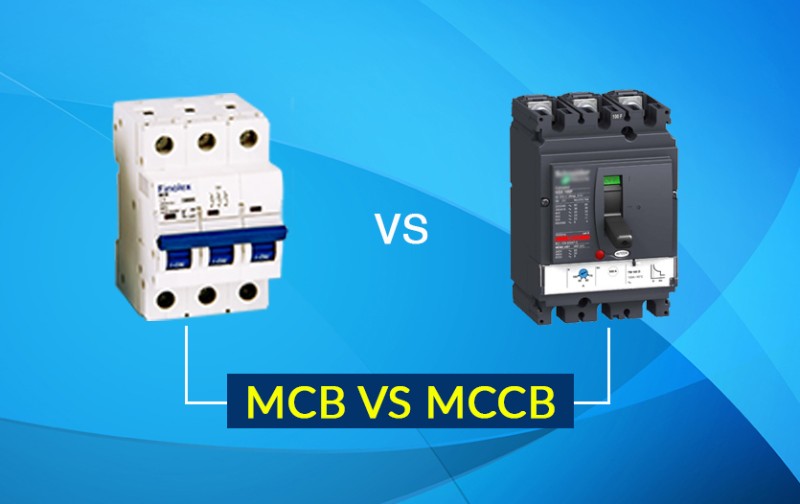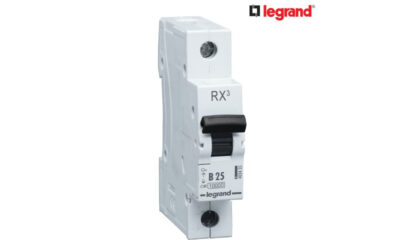Gadget
An Overview Of Circuit Breakers

Each type of circuit breaker—MCB, mccb, and RCCB—was developed to address a unique problem. MCB, MCCB, and RCCB all have their benefits, which are listed below.
MCB
Miniature circuit breakers are referred to as mcbs. An mcb is an electromechanical circuit breaker that instantly disconnects power whenever an issue is identified.
Overcurrent generated by short circuits can be easily detected using miniature circuit breakers. This type of microcircuit operates on a straightforward premise, and one contact is stationary while the other can be moved.
Benefits Of Using MCBs:
- The sensitivity of mcbs to current is higher than that of fuses.
- It quickly eliminates the danger of short circuits.
- Overloading and Undervoltage are no match for its speedy response.
- Resuming delivery is a breeze with this system.
MCCB
However, MCCBs are the abbreviation for moulded-case circuit breakers. The moulded case circuit breaker provides overload protection. It also features a manual switch that can be used to trip the circuit.
The gadget can be set up in either an overcurrent or overtemperature configuration. Furthermore, the bimetallic contacts that make up the moulded case circuit breaker contract and expand as the temperature varies.
Under normal conditions, current can flow through the contacts and complete the circuit. However, their contacts will warm, swell, and open if the current is higher beyond a certain threshold.
Because of this, the equipment is shielded from potential harm as the circuit is cut off from the main power.
Benefits Of Using MCCB:
- There is no up-front cost and low ongoing expenses.
- This gadget’s size is manageable, reducing the need for a large panel area.
- An mccb can reset several problems before it needs to be replaced.
- The MCCB can be used with various adapters in this circuit breaker.
RCCB
A residual current circuit breaker is abbreviated as “RCCB.” RCB and RCD are shorter forms of rccbs. Both the RCD and the RCB are examples of residual current devices.
When the RCCB senses current leaking to the ground wire, it automatically closes the circuit. An electric shock or electric shock from direct touch can also be avoided.
Devices that cut off residual current are known as rccbs. This safety is provided by constantly checking the neutral and line current, and the return flow at the neutral point balances the line current in a typical circuit.
However, this return flow might not balance the line’s current flow in an unexpected circumstance. If this happens, the residual current device will trip the power.
Benefits Of Using RCCB
- Earth fault and leakage current prevention are included.
- When the preset threshold is breached, the circuit will shut off automatically.
- Allows for cable and busbar connections to be terminated separately.
- Includes a filtering device to defend against transient voltage levels, so you won’t have to worry about damage from voltage fluctuations.
Conclusion
You and your electrical appliances can be well protected using an mcb, MCCB, or RCCB. The preceding comparisons help you decide which option is ideal for your needs. Make sure you only shop at reputable stores like IndoAsian, though.
-
Health3 weeks ago
Back to Roots: Ayurveda Offers Natural Cure for Common Hair Woes
-

 Tech3 weeks ago
Tech3 weeks agoFrom Soil to Silicon: The Rise of Agriculture AI and Drone Innovations in 2025
-

 Science7 days ago
Science7 days agoJuly Full Moon 2025: Everything You Should Need to Know, When and Where to See Buck Moon
-

 Sports3 weeks ago
Sports3 weeks agoFIBA 3×3 World Cup 2025: Full Schedule, Preview, and How to Watch
-

 Gadget4 weeks ago
Gadget4 weeks agoThings to Know about Samsung Galaxy S26: What’s New and What’s Next
-

 Tech4 weeks ago
Tech4 weeks agoAdobe Firefly App Now Available on iOS and Android Phones to Create AI Images and Videos Anywhere
-

 Sports2 weeks ago
Sports2 weeks agoPrefontaine Classic 2025: Full Schedule, Preview, Field, Events and How to Watch Diamond League Eugene Live
-

 Festivals & Events3 weeks ago
Festivals & Events3 weeks agoEverything You Should Need to Know about Summer Solstice 2025















